 BBC News
BBC NewsBorrowing was £17.4bn last month, the second highest October figure since monthly records began in 1993.
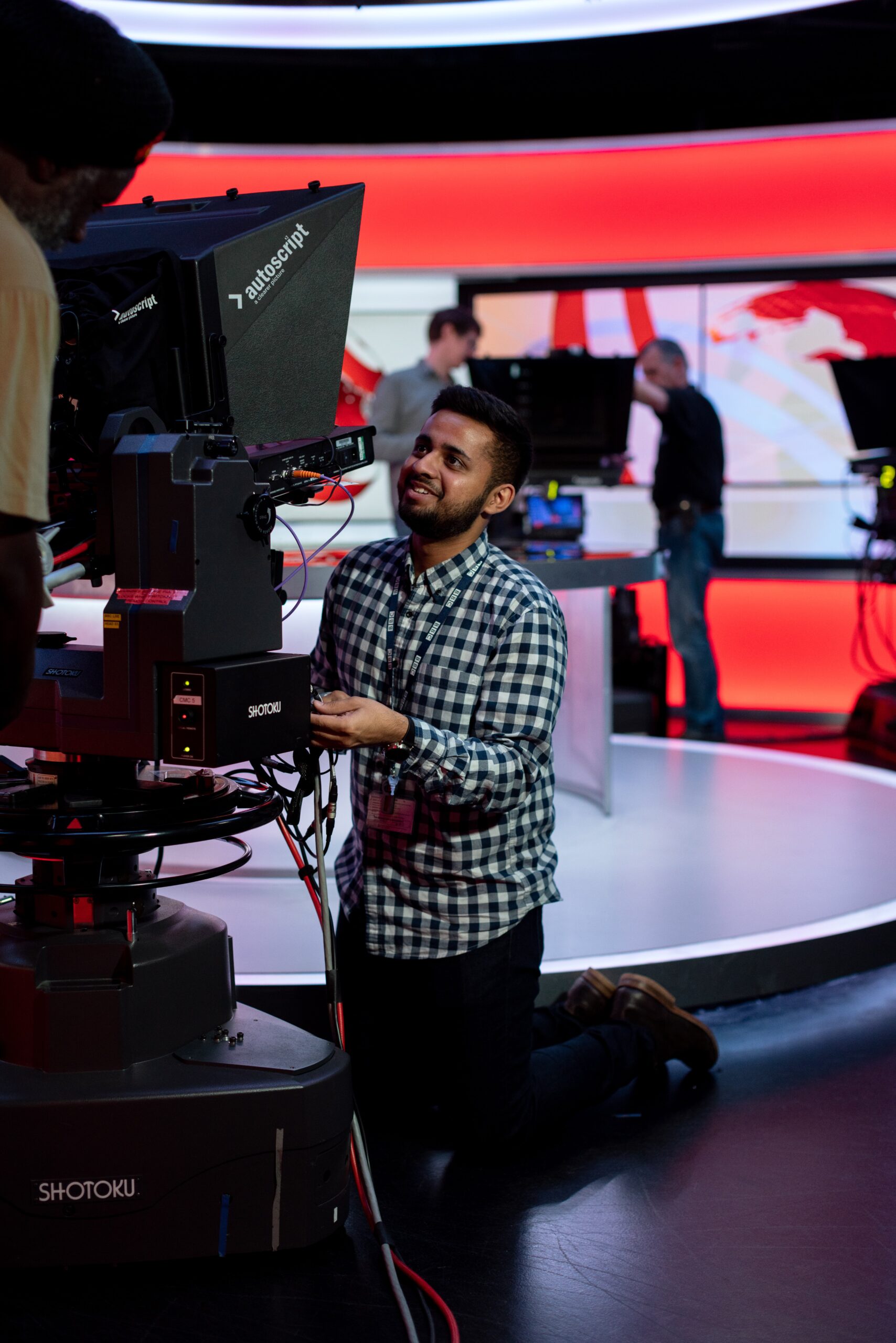
By Christopher Jackson
Three years ago, invitations began trickling into my inbox to appear on television. At that time, I was the author of one of the only books about the then Prime Minister Theresa May. The first time a request came in, I happened to be in Zanzibar, on holiday with family. The email came via my publisher from a researcher with a Sky Newsemail address asking me on All Out Politics, presented by Adam Boulton.
The memory transports me back to the mixture of emotions I felt at the time: flattery, excitement – and of course, fear. It was the television and restaurant critic AA Gill who recalled on the occasion of his first appearance on live television the makeup artist saying: ‘Just act normal!” Gill recalled himself thinking: “But this is the least normal thing I’ve ever done.”
That remains true, of course. On the Zanzibar occasion, I had my excuses. If my plan was not to appear on television, I had positioned myself perfectly. Before the trip, I had intentionally not packed my laptop in a bid to switch off properly. Stone Town, the nearest outpost of civilisation to my hotel, wasn’t stocked with 5 star hotels which might have wanted to set up a live video link for a tourist who had walked in off the street babbling about Adam Boulton and Theresa May.
So on that occasion I declined – but with a certain guilt, knowing that while it hadn’t actually been possible, part of me hadn’t wanted to do so. Even so, a seed had been planted, and I began to suspect that if one person might invite me on TV then so might others – and I might not always have the protective shield of a holiday in Zanzibar to bat the problem away. There might come a time when I might have to say yes.
Whether to say yes or not is therefore the first question that is likely to affect you when the flattering but somewhat-to-be-dreaded call comes. Some will feel immediately inclined to say yes but others will be more doubtful.
When I speak with Lord Dennis Stevenson, the former chair of HBOS, he recalls a similar approach. “I happened to be very successful very young and – at risk of letting readers know how old I am – in those days there were only two television channels – and both wanted to do big documentaries on me.” Stevenson faced a definite fork in the road, and turned to a valued mentor for advice. “I went to David Astor, who was the son of Nancy Astor the famous politician. David was one of my heroes. He said, “If you tell any of my journalists this, I will kill you, but if there’s ever a request for you to appear, don’t do it unless it will help promote a cause you believe in.”
For Stevenson, the negatives outweighed the benefits: “David went on to say: “At the moment any programme you do will make your mother feel very proud, but it’s an unnatural thing to do. Besides there may come a time when things aren’t going so well and then you’ll be much better dealt with on the way down if you’ve not been on television.”
In my own instance it would have been an unfairness on the publisher, who had shouldered the costs of the book, not to proceed. But others should be wary. Dominic Mohan, the founder of Dominic Mohan Media and former editor of The Sun, tells me: “I will deter a client from an appearance as a pundit or commentator if they are not entirely comfortable with the subject areas – I don’t want them to be outside their comfort zone.”
Of course, if you say yes, there is a confidence boost of a not necessarily trustworthy kind around the corner. In a television-dominated society, there’s a sense in which you’re not really successful unless you have appeared on television. Of course, there are some who buck this trend. In literature, there are successful recluses like JD Salinger or Thomas Pynchon whose myth is partly linked to their having ducked out of the pubic discussion of their works. There remain many successful businessmen like Stevenson, who spend a sizeable chunk of their income keeping out of the media. Most people are probably television agnostic – they deal with the matter when it comes up.
That means that many of us are caught unprepared. The following week I was asked again to appear on All Out Politics, and found myself saying yes. Beforehand when I asked Zoe Brennan of Portland Communications for advice on going on television she said, pointing at a blue and white striped shirt I’d just bought from Pink,: ‘Don’t wear that shirt’.
Armed with the limited knowledge that a white shirt is best on television, and lacking PR representation of any kind, I found myself going up to Sky News’ studios for my slot – which again, was with Adam Boulton.
I didn’t view the occasion with unmitigated glee – and in this I suspect I was reasonably typical. Others relish these occasions, and if you can get yourself into that mentality, it will certainly do you good on camera. When I speak to celebrity lawyer, Nick Freeman – otherwise known as Mr Loophole – he radiates enthusiasm: “I love being on TV. The adrenalin flows. Yes, you’re going to be nervous, but I’ve done hundreds of interviews and I find the adrenalin helps you to perform. It’s your chance to flourish.”
So how does he manage to feel confident before the big occasion? Freeman is infectiously helpful. “You can’t just say, ‘I’m going to be fine’ and leave it at that. Preparation is king. Knowledge is king. Know your subject.” Freeman also alikens the process of going on television to an actual job interview: “You wouldn’t go to a job interview without having carefully researched the business – so don’t go on TV without careful preparation.”
There are limits to this, of course, because overpreparation can also be a danger. Mohan tells me: “I will obviously ensure I speak to the journalist or producer ahead of the interview to see what they’re thinking and where the interview is likely to head. However, as a former interviewer myself, I am conscious not to over-media train some clients as I want their true personality, views, language and style to come across.”
Most media experts flag that the danger of deciding too carefully what you’re going to say is that you don’t listen to the answer. Iain Dale, the LBC broadcaster and author, points out that this is something to consider on the interviewer’s side as well: “What I’ve found on the rare occasions when I have had producers give me a brief of the areas I’m meant to cover, and told me what the questions are, is that you’re so busy concentrating which one of these you should do next that you’re not listening to what the person is saying.” This accounts, says Dale, for some odd moments you sometimes hear on the radio. “Whenever you think an interviewer asks what you think is a random question it’s because they haven’t been listening to the previous answer.”

On the way up to Sky News, I doubt that Freeman’s advice to know my subject would have been entirely helpful. As the biographer of Theresa May, my subject in theory encompassed not just the whole of Brexit, but the whole gamut of policy. That meant that, as hard as I’d worked on the book, it was wholly impossible to be the complete master of what I had been called on to discuss.
In the event of it, I turned up at Millbank on the back of a seven mile run, a course of action I’d recommend to anyone about to endure the stresses of live television. I’ve often wondered in retrospect whether I was too physically tired to be particularly nervous.
Even so, the reality of walking into a television studio is very strange: one feels as though one must be trespassing. This sense of portentousness also seems at odds with the mundanity of a typical TV studio. Sky’s Westminster studio, for instance, feels somewhat unloved – much as Parliament does once you’re inside. There is the sense that this building must very recently have had some other purpose – either as a middling solicitor’s office, or as the rundown domain of a recently deceased think tank. And yet in spite of this, you also know that this building is about to beam you to a million people.
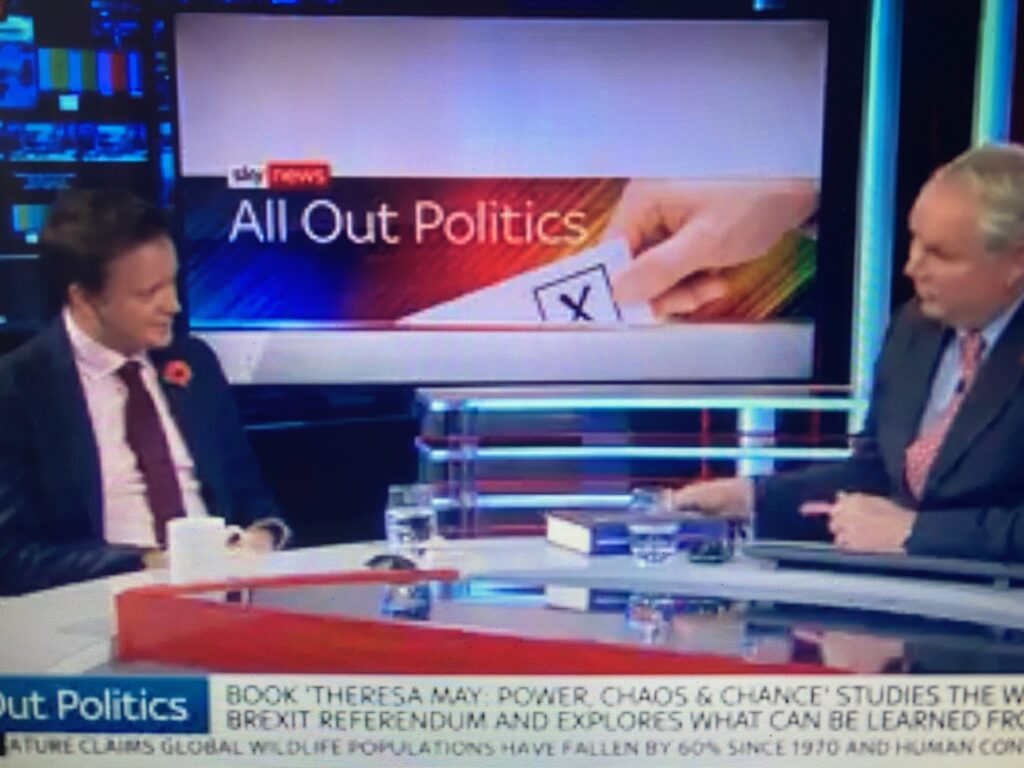
That’s where television gets its core strangeness from. Try imagining a million people and your imagination balks a bit – and obviously this will lead to some people freezing or panicking. But the sheer enormity of the occasion can also be a help: once the mind is stymied in trying to imagine such a large audience you end up putting it to one side, increasing your chances of a coherent performance.
Up in the Sky studio, there’s a small reception desk, and a little side room for makeup. The people on before you all look as though they belong in the studio and if you’re not careful you can worry that you alone among all the other fleeting guests lack some essential TV-readiness. It feels a bit like an awkward dinner-party. Rather oddly, waiting for a make-up chair to become vacant, I am directed to a kitchenette, overlooking the Thames, where I make myself a cup of instant coffee.
After make-up, I am ushered down a corridor. To your right as you walk, you can see Adam Boulton in his layer, handling what will turn out to be a forgettable roundtable discussion. It occurs to me that this is precisely the goal for most people of appearing on television: to produce a segment of entirely forgettable television. In this era of YouTube sensations, the creation of memorable television is almost always not what you want.
There then follows a strange bit of small talk with an usher. I am asked to conduct small talk all the while aware that I am about to do something extraordinarily stressful. This brief moment beforehand will turn out to be the hardest part of the experience. Time bends a bit. You are conscious that you’re hurtling towards a now unavoidable ordeal, but also that that ordeal seems to be taking a long time to come about.
In the event of it the conversation goes well. Inherent in the nature of television is that questions rarely tend to any depth, and the presenters themselves are so busy that it’s not to be expected that Adam Boulton, if he is interviewing you about his book, has actually read it; it’s more likely that one of his researchers has skimmed it.
The conversation was divided into two segments of roughly five minutes each. In the ad break, Boulton smiled to himself and looking down at my book said with perhaps a certain pity: “So when did you write this, then?”
I told him and he smiled to himself as if at the enormity of my folly, and then looked into a glass case at an iPad. This he began scrolling, retweeting a few articles, radiating the run of the mill nature of the occasion from his own perspective. Then it was back into the conversation, which unfurled without too many mishaps.
Afterwards, a car is there to take you where you need to go – the most VIP aspect of the whole occasion. News International has obviously decided to expend budget on getting its guests from A to B. As I weave through the crowds of Parliament Square towards a day of quotidian work, I see many people definitely not thinking about the fact that I’ve just been on Sky: television seems to occur in a secret bit of our collective mind.
Of course part of the fear of television these days is that it has become so much more polarised as a medium. Especially if you’re on to talk about politics, part of the reason you’re nervous is the uncertain emotion you suspect to be roiling in the country at large.
When I speak to Douglas Murray, the author and commentator, he recalls the nature of the appearances he’d made in the past: “When The Madness of Crowds came out, I was in a radio discussion – actually a rather badly imagined programme – where you bring together two people from different sides of the political spectrum, and then negotiate some sort of agreement.”
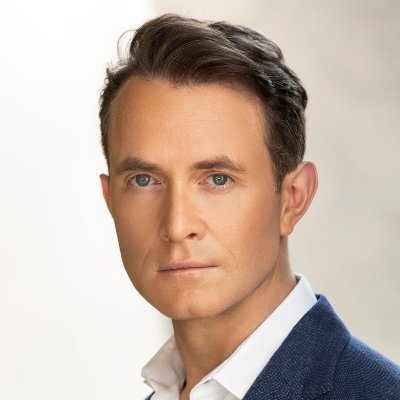
When I ask Murray how he prepared for the occasion, he smiles: “I was on with somebody from The Guardian, who’d had a book out some weeks previously. I’d gone to Waterstones of my own volition and brought it with my own money – I even got the staff to get it off the stock in the back of the shop, where I’m happy to say it was residing. My enemy had been remaindered. I read it and it wasn’t good, although I found a review of it in The Guardian describing it as the work of a great historian and one of the titans of the age and so forth.”
And when Murray got to the studio? “I realised immediately that not only had she not read my book, but she’d made no effort to read it, and had read none of my previous books either. At the end of the show the presenter asked if she’d learned anything, and she said: “Well, I know what Douglas thinks already.” That’s very telling of the intellectual divide in this country.”
Of course that feels initially more of a problem for those of us who happen to comment on politics. Some people I speak with have their own private rules. Dennis Stevenson tells me: “I won’t go on the Today programme as I’ve found them to be very irresponsible. Though I don’t think much of the News International empire, I’ve found Sky to be infinitely more responsible.”
Especially after Brexit and Covid-19, politics today appears to be so contentious that it can even affect a hotelier who happens to be on television. When I speak to Sir Rocco Forte he recalls for me an appearance on Question Time with David Dimbleby. “I think there was a rape case or something like that. I said: ‘Of course, I was brought up to treat women with respect, as they are the weaker sex,’ and one of the left wing panellists said: ‘You should arm-wrestle my daughter’.”
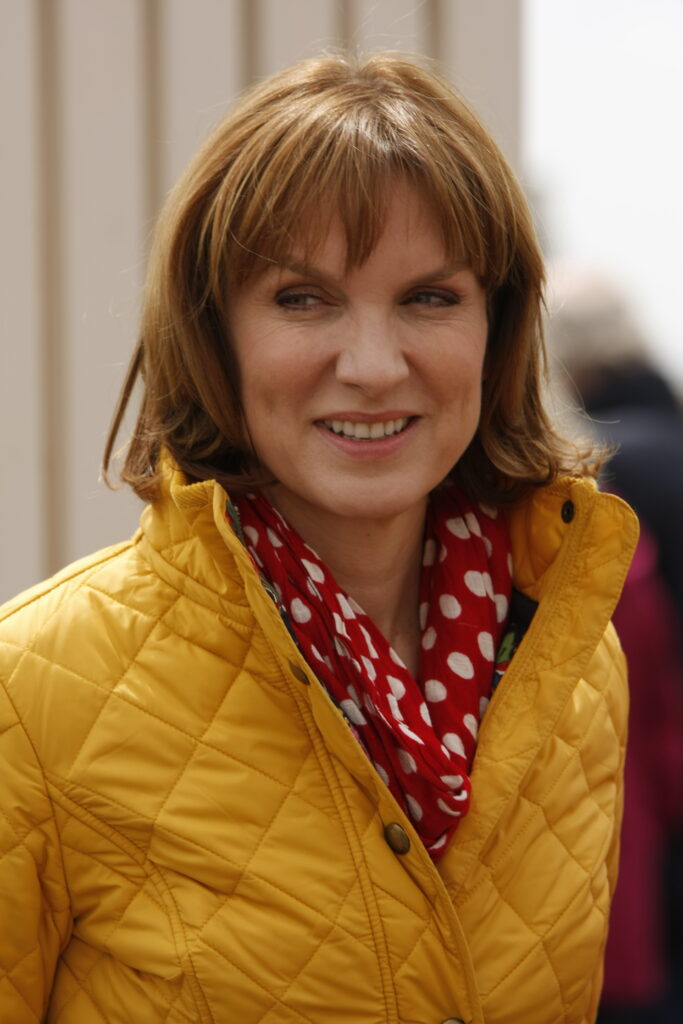
Sat in Browns, one of many hotels he owns, and with his confident, patrician voice, you initially imagine television would hold little anxiety for him. But he disagrees: “You always get nervous because you’re worried about making a fool of yourself!” So how did he cope? Forte echoes Freeman. “You have to have a clear idea of what you want to say and then it depends on the kind of programme you’re on. I was on Question Time on another occasion and I got an unexpected question on the Arab-Israeli situation, and I had to think about my Arab and Israeli clients as I was talking, and so I must admit I gave a very wishy-washy answer.”
So would he advise our business readership to do TV? “Businessmen shouldn’t do these things because they’re always going to feel political and you’re going to offend some element of your customer base. As it happens, because I have very personalised hotels, I think a large majority of my customers would probably agree with what I have to say.”
My second appearance on television for Bloomberg occurred on an extraordinarily cold morning in December, very early in the dark. For this occasion, I was prepped by the excellent Malika Shermatova of Minerva PR, who was kindly up at the same ungodly hour – about 5am – to accompany me in the pitch black to College Green. I suspect we both had that strange form of tiredness you get when catching an early flight.
This occasion was a reminder that once you’ve said yes to television, you are in the channel’s hands as to what happens next. On this occasion, it transpired that the news anchor, whose name I have never been able to discover, was angry at not being in the warmth of a studio. An acolyte was charged with rushing between takes to place a blanket on her knee and she was visibly irritated throughout by her predicament. The presence of me on the chair opposite her didn’t seem in any way to mitigate those emotions.
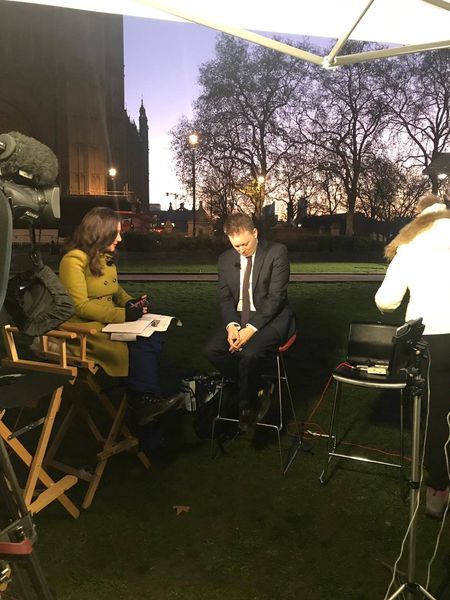
Again, it was clear that she hadn’t read the book, and on this occasion I was asked some unexpected procedural questions about what was going on in parliament on that day. Unexpectedly, I found myself putting my finger and thumb together, as Tony Blair used to do, in a series of jabbing points designed to project confidence. This tactic, arrived at spontaneously, made me all at once sympathetic to politicians who do this on a daily basis.
When I catch up with Sir Alan Duncan who, though a Marmite figure, was always good on television, I ask him how to be good on TV. “I wish,” he sighs acerbically, “you had asked another question about what parliamentarians should do in Parliament!”
Retrospectively irritated, as often seems the case with Alan Duncan, that he was never prime minister, he continues: “The trouble is that the people there only think about the media and not parliament which is their job.”
I press him on the question a bit. “Well, the answer to your question is to forget the script and just be normal. Talk as if you’re talking to a teddy bear on a chair five feet away – that’s the sort of intimacy you should aim for.”
And what about the sheer unpredictability of the occasion, such as I encountered at Bloomberg? “Yes, that’s why you must stay relaxed – because they could cut you or make you a minute long, or also give you a difficult question, and if you don’t stay relaxed it could get out of your control.”
After a while, the interest in May increased to such an extent that I was being asked on television most weeks, and often by foreign media who were covering Brexit with increasing bemusement. These proved to be extremely enjoyable, because they were usually pre-records which are far more in-depth and less stressful. I began to fit these in around other things, and even to make a few demands about when and where to speak.
I would advise anyone asked to appear on television to try and dictate terms, and see if a pre-record is an option. There was a half hour chat with Clive Bull on LBC recorded on Christmas Eve, which was broadcast in full on New Year’s Day. There was also a Polish TV interview conducted at work meaning I didn’t have to travel anywhere. On another occasion, an on-camera interview next to the playground at Dulwich was filmed while my son played about fifty metres away. Perhaps most fondly, I recall a chat with the magnificent Kim Bildsoe-Lassen, Denmark’s Andrew Marr, who once conducted a famously tough interview with George W. Bush, and who interviewed me in the Four Seasons and then insisted we have breakfast on another occasion afterwards.
The real Andrew Marr turns out to be very agreeable in person – though frailer than one might have imagined. I meet him at an exhibition of his paintings, and am able to tell him that I bought one of his pictures just before our encounter. “Oh, a book on Theresa May – you must send it to me,” he says, before locking eyes with me reassuringly: “I will read it, you know.”
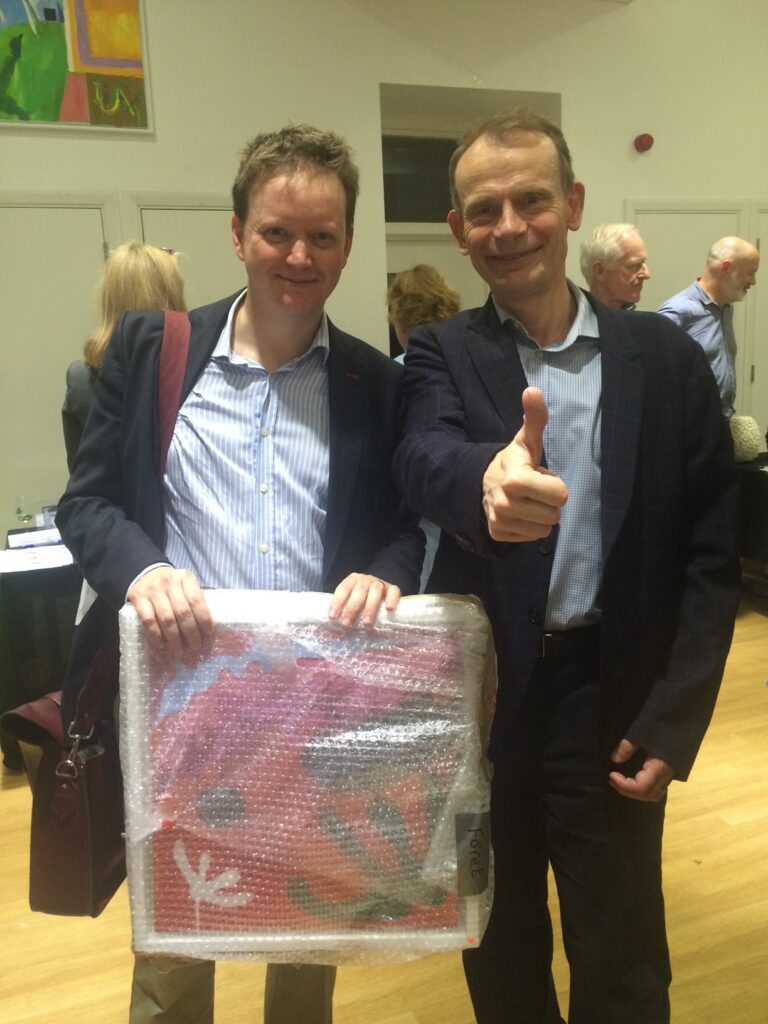
But it seems fitting that most of our conversation isn’t about TV at all, but about painting, which is his principal interest now. I’ve rarely seen a person’s face light up as much as it does when Marr sees fellow painter and collaborator Adrian Hemming among the crowds. When he leaves at the end, he is relaxed about the work awaiting the following morning: “I must go – interviewing the PM in the morning.”
Television and radio were never normal for me, as they are for Marr or for Boulton. If Marr ever read my Theresa May book he decided it didn’t qualify me to review the newspapers on his show – and I must confess that I felt some relief about that, though I suspect I would have had to say yes if he had done. A part of me would still endorse Dennis Stevenson’s verdict on television: “I don’t like it. I don’t like it at all.”
Towards the end of the book promotion cycle I found myself saying no – especially to very early appearances in Sky’s studio in Osterley. Today the problems of travelling to the studio have receded somewhat due to the pandemic, but that opens up questions regarding your domestic setup.
Dominic Mohan recalls one unhappy experience: “Early on in my journalistic career and then a father of young children, I did a broadcast interview from home with Alan Brazil on TalkSport. I was alone with my three year old son who I thought was happily playing in the other room. As the chat began, he battered down the door of my office and began to grab my leg, weep and scream at me throughout it. Needless to say, the exchange was cut short and I was never asked back.”
For my part, I remember my three-year-old biting my leg during a discussion on LBC which itself seems to have curtailed my relationship with that organisation.
But overall, the experience isn’t something I’d take back. It can be fortifying, and can lead to making new friends, and new connections. And David Astor is right that if you do find a cause in the future which you believe in, television is still among the best ways of promoting it. Your contacts may come in useful at some later point.
As for me, over time, new books will come out with my name on the spine and cover, and perhaps the whole rigmarole will begin again. I’ve sometimes vaguely asked myself how I’ll feel about it. As soon as I do that, I feel that jolt of adrenalin which makes me know I’d say yes – but that, as AA Gill knew, it will never be normal.